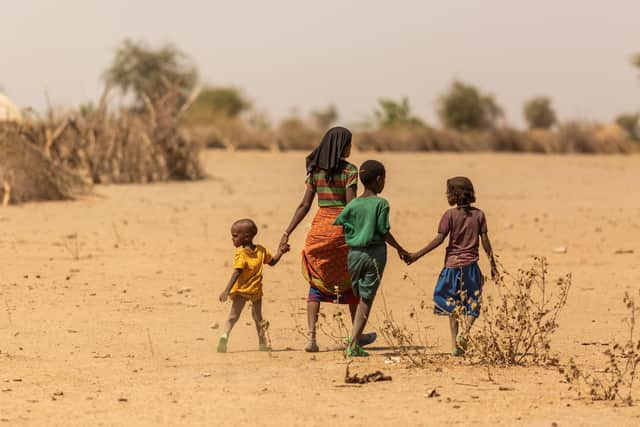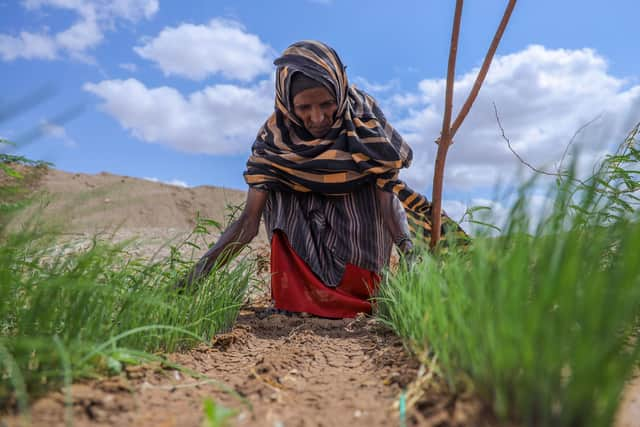Drought situation in East Africa ‘at crisis level’ as Scottish Government pledges funding
Four charities are to each receive £125,000 from the Scottish Government’s Humanitarian Emergency Fund to tackle the food crisis in South Sudan, Kenya and Ethiopia caused by the ongoing drought.
The charities - Christian Aid, Mercy Corps, SCIAF and Tearfund - described how in some villages, families are left without any food for days, and warned people are resorting to “drastic measures to keep their families alive”.
Advertisement
Hide AdAdvertisement
Hide AdEast Africa is facing one of its most severe episodes of drought in decades, with the driest conditions seen in 40 years. The fifth consecutive rainy season is lower than expected and the forecast for the coming season is also set to be below average.


The extreme water shortages have resulted in massive losses of harvests, livestock, and income. Local commodity prices also remain at an all-time high, out of reach for many, while experts warn the combination of climate and conflict in the region is worsening an already dire humanitarian situation.
The announcement comes days after United Nations refugee arm, UNHCR, appealed for funding of $137 million for the 3.3 million refugees and internally displaced people in East Africa who have been forced to flee their homes.
The funding will help aid workers distribute food packages, help improve access to clean water supplies and provide cash transfers to households in desperate need.
Alistair Dutton, chief executive of SCIAF, visited Ethiopia ten days ago, where he described the situation as “desperate”.


He said: “With riverbeds dry, we saw people digging shallow wells to unearth small pools of water to drink and water the cattle but even that isn’t possible away from the rivers.”
The SCIAF project in Ethiopia will provide food supplies and access to safe water in Dasenech Woreda, South Omo Zone. Under the scheme, 315 households will receive cash transfers for four months while the rehabilitation of shallow wells and water points, along with water purification materials, will improve access to safe water for 7,000 households.
He added: “The day before we arrived the local authority in South Omo had announced that the water in the river would only last another two weeks, and they urgently appealed for aid agencies to begin water trucking. In this chilling context the Scottish Government’s funding will make an enormous difference and allow SCIAF’s local partners to provide urgently needed services to people whose options are running out.”
Advertisement
Hide AdAdvertisement
Hide AdKunow Sheikh Abdi, Kenya director of Mercy Corps, which will use the funding to support vulnerable communities in north-eastern Kenya, said the population in the region was “at a crisis level”.
He said: “Despite the intensifying hunger situation, humanitarian response funding is decreasing at the same time. We are seeing an increasing number of displaced families going without food for days and shockingly levels of acute malnutrition among children.
"Parents are forced to leave their children in villages without food they search for pasture for few remaining livestock and sometimes making difficult decisions, including marrying off their young girls.
He added: "Millions of livestock have so far been lost in the ongoing drought.”
Tearfund’s proposed project in Ethiopia will deliver emergency food assistance in Moyale District, Oromia Region. Three packages of food supplies will be provided to 334 households over a three-month period. In addition, supplementary blended food will be distributed to 70 individuals.
Lorna McDonald, head of Tearfund Scotland, said in Ethiopia alone, almost 10 million people do not have enough food to eat.
She said: “We are grateful that the funding from the Scottish Government will enable Tearfund’s local partner to extend its support to an additional 3,000 people in the Oromia region, helping health workers to identify the worst cases of malnutrition and provide vulnerable families with food to sustain them over the next three months.
Meanwhile, Christian Aid will target funding at communities in South Sudan to provide emergency food access and sanitation to over 4,000 people in Kodok, Upper Nile State and further 681 households will receive cash transfers to meet their immediate food needs, in addition to sanitation facilities and hygiene promotion.
Advertisement
Hide AdAdvertisement
Hide AdHead of Christian Aid Scotland, Val Brown, said: “The issues around food insecurity in South Sudan are multi-layered, and extreme weather and conflict have undoubtedly played a part, but the stark reality is that people simply don’t have enough to eat.
"Sometimes families have to decide which member of the household will eat that day, as there isn’t enough to go round. We’re grateful to the Scottish Government for showing solidarity with the people of South Sudan and the wider East Africa region. Christian Aid, through a local partner, will ensure this money enables vulnerable families to buy food essentials and is also used for improvements to toilet facilities and increased hygiene awareness.”
International Development Minister Neil Gray said: “The drought affecting countries in East Africa is one of the worst in decades and the situation is becoming ever more desperate. This funding will support four essential projects in South Sudan, Ethiopia and Kenya, ensuring people suffering from the drought receive necessary food supplies and enhanced access to clean water – a vital measure in preventing water borne diseases.
“The Scottish Government is committed to fulfilling its role as a responsible and compassionate global citizen and this aid from our Humanitarian Emergency Fund will provide essential help to those in desperate need.”
Comments
Want to join the conversation? Please or to comment on this article.